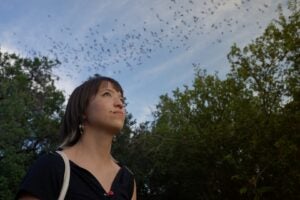AUSTIN, Texas—A professor in the College of Education at The University of Texas at Austin has received a five-year, $1.4 million grant from the National Science Foundation to study effective strategies for keeping new science teachers from leaving the profession.
Dr. Julie Luft, an associate professor in the Department of Curriculum and Instruction, will be examining four groups of beginning secondary science teachers, with the goal of describing their development during their first three years on the job. With the data collected, she hopes to offer insights into useful retention techniques and mentoring practices.
“Most induction programs for new teachers are general in nature and address challenges that all teachers may face, such as classroom management or lesson planning,” said Luft. “But science teachers face their own unique brand of challenges and we want to look at what will work best for them specifically as they make that transition into teaching during their initial years.
“We know that safety issues surrounding student lab work and setting up labs can cause stress for new teachers, for example, and be a huge challenge. These are unique issues that an English or mathematics teacher will not encounter.”
Luft and a team of four graduate students will be looking at four different groups of science teachers who are going through four separate induction experiences and evaluating how differently they develop and how their beliefs about teaching and science evolve.
Using 120 science teachers from Central Texas and Minnesota school districts, Luft will be looking at one group that is receiving general induction experience, which will include support in areas such as classroom management and lesson-planning. She also will be examining a group receiving science-specific induction experience, one that will get electronic mentoring and one group of interns who are getting their teaching credentials while on the job and receiving no induction experience at all.
The study, which is building upon a similar but more abbreviated study Luft did while at the University of Arizona, is in its pilot year this first year, and Luft is using this time to examine the model of analysis and develop research instruments.
In her Arizona study, Luft observed that science teachers who enjoyed the benefits of a science-specific induction program also felt fewer constraints on their teaching than did teachers in the other two groups and implemented more student-centered inquiry lessons. According to Luft, the Arizona study reinforced the notion that specialized support programs for beginning science teachers are crucial, and, armed with the study results, she recommended that universities and schools make it a priority to work together to develop effective programs.
Realizing that teacher recruitment practices may hold the key to increased teacher retention, Luft also is conducting research with The University of Texas at Austin’s UTeach program. She is studying how prospective math and science teachers develop from the beginning of their teacher education program to their first years in the classroom. UTeach is a collaborative effort among the College of Natural Sciences, College of Education and Austin Independent School District to recruit undergraduate students in natural sciences and train them as secondary teachers.
“Teacher education programs do produce enough teachers, but for some reason a lot of them are not entering teaching or are leaving right after their first years,” said Luft. “Some of the attrition may have to do with being able to get a higher salary at another job, but, overall I don’t think it’s that simple. The reasons people go into teaching are complex, and we’re finding that the reasons they leave are just as complex. Working with these UTeach students, we want to see what recruitment techniques can be improved so that we’ll have what we all want—more effective teachers, for however long they stay on the job.”
For more information contact: Kay Randall, College of Education, 512-232-3910.



